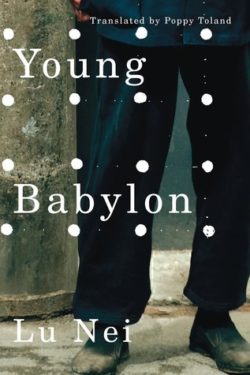Young Babylon by Lu Nei
translated by Poppy Toland
2015, Amazon Crossing
Publisher's Blurb
Knowing nothing more than the working-class life he is born into, headstrong Lu Xiaolu reluctantly starts down the path he is expected to follow. At age nineteen in 1990s China, he feels pressure to follow suit with those around him and takes a job at the town’s saccharin factory. Slowly, he adjusts to the bureaucratic factory routine, making the best of the situation by bonding with coworkers, flirting with girls, and refusing to give in completely to the expectations of those around him.
As Lu Xiaolu finds his way, a startling portrait of an economically expanding China comes into view; the propaganda of a common goal gives way to a bottom-line system that he sees as indifferent to individual happiness. But thanks to the relationships he develops, Lu Xiaolu decides to fight for the life he wants.
Reading Chinese Network Reviews
Reviewed by Hsiu-Chih Sheu, 21/1/20
 Xiaolu, a 30 -year- old man is the narrator of the story. At the behest of his young girlfriend, he reminisced what it was like to be a 19-year-old factory worker in the small city of Daicheng. Born into a factory workers family, Xiaolu was predestined to follow into his father’s steps. Xiaolu’s big dream was to work in the propaganda department of the factory, which would have provided a decedent salary and plenty of free time, but his poor results at school meant that was impossible. Through his father’s connection, he landed a bottom job of bench worker at the saccharin factory.
Xiaolu, a 30 -year- old man is the narrator of the story. At the behest of his young girlfriend, he reminisced what it was like to be a 19-year-old factory worker in the small city of Daicheng. Born into a factory workers family, Xiaolu was predestined to follow into his father’s steps. Xiaolu’s big dream was to work in the propaganda department of the factory, which would have provided a decedent salary and plenty of free time, but his poor results at school meant that was impossible. Through his father’s connection, he landed a bottom job of bench worker at the saccharin factory.
Working three shifts on the production line was dull, but Xiaolu soon discovers the potential of the factory’s microcosm. A bit of humour helps turn everyday life into farce, the state-run factory into a stage and the workers into accomplished actors. Soon the reader is caught in the tales of romance, hierarchy, fighting, adultery, match making and jealousy. In one instance, the narrator describes how desperate people climb up to the big smokestack of the boiler to commit suicide. When a female worker’s affair with the manager is discovered, she climbs up the smokestack and immediately attracted a big crowd.
“She was dangling from the sixty-five foot mark, displaying the power of love. For buns, you’d climb to thirty feet. For love, you would climb to sixty-five. But if you climbed to a hundred feet, to the top, it was for no reason other than wanting to die. This showed that love ranked higher than hunger, but not as high as death. “ (p.112)
Lu Nei depicts, through the format of a sitcom, the life of the workers in a socialist factory in the 1990s. This is a first hand account of a life that the narrator experienced himself.
As someone who grew up in Taiwan in the 90s, I am surprised to find a lot of commonalities with the scenes in the book. For a lot of young people growing up in the 90s in Taiwan as in China, life was one way only. It took a lot of courage to run away from your preordained life, which Xiaolun did in the end.
This book gives a good account of the Chinese society of the 90s, and provides many a good laugh in the bargain. Highly recommended.
Reviewed by Hsiu-Chih Sheu
Reviewed by Tamara McCombe, 5/9/18
 If you are a fan of humour from the likes of Will Self then Young Babylon might be for you. This novel by Lu Nei might be described as the author’s fictionalised and exaggerated memoirs of his itinerant youth, passing from menial job to menial job in and around Shanghai. The novel is reminiscent of a journal as the thematic chapters are broken up into the protagonist Lu Xiaolu’s separate streams of thought. These chapter titles are a magnifying glass into Lu’s emotions and psychology, that is to say he is a mix of a romantic and depressing realist.
If you are a fan of humour from the likes of Will Self then Young Babylon might be for you. This novel by Lu Nei might be described as the author’s fictionalised and exaggerated memoirs of his itinerant youth, passing from menial job to menial job in and around Shanghai. The novel is reminiscent of a journal as the thematic chapters are broken up into the protagonist Lu Xiaolu’s separate streams of thought. These chapter titles are a magnifying glass into Lu’s emotions and psychology, that is to say he is a mix of a romantic and depressing realist.
If the reader takes Young Babylon as the journal of a young man rather than a novel then it is clearer why the dialogue, descriptions of people and that of the surroundings are so lurid and crude - characters are named after physical characteristics such as ‘Wonky Balls’ - which is symptomatic of the protagonist being a sexually frustrated nineteen year old and belies his simple mindedness.
The novel takes place in Daicheng, a town “somewhere between Shanghai and Nanjing”, during the 1990s. Although Deng Xiaoping’s Opening Up and Reform Era was well underway by this time, the novel suggests that only a few selected areas (mostly the Special Economic Zones on China’s East coast) were actually touched by and prospered as a result of the period’s policies. Most cities, like Daicheng, were still characterised and burdened by what products the factories produced. Anti-communists will relish the descriptions of the petty hierarchies - with job positions dictating status, relationships, behaviours and questionable morals - and inefficient workers such as ‘The Don Quixote of Light Bulb Changing’.
The protagonist Lu Xiaolu is at once an unremarkable young man, performing badly in school exams, yet also acutely aware of what he might be able to achieve. He has goals but ring fences his hopes, not wanting to be victim to being let down by the harsh reality of his situation. Instead of pursuing studies to potentially gain better employment he gets a job in the local saccharin factory, a poignant symbol of Daicheng. Saccharin is an artificial sweetener with effectively no energy value, it does not raise blood sugar levels and has a bitter or metallic aftertaste at high concentrations. The myth surrounding Daicheng’s foundation suggests that it was built in “the great spring and autumn period of Chinese history” and that it was an “enchanting” place. However, the reality is that it is a life-sucking industrial urban landscape populated with disenchanted workers. Saccharin was first discovered in 1878 by researcher Constantin Fahlberg, who was working on coal tar derivatives in a laboratory at the John Hopkins University in Baltimore. Daicheng produces other more industrial products and perhaps I am reading too far into the author’s research for possible factories for his protagonist to work in but maybe Lu was hooked by the saccharin metaphor for the Chinese government’s industrialisation as a false sweetener for society.
Lu Xiaolu is a frank narrator, he recounts vignettes of his life in lurid physical and sexual detail. He is a product of his surroundings and fellow characters who are likewise straightforward in their communication, areas of town are not given romanticised names, they are instead named after the products that are produced there such as “Pesticide New Village”. At times I tired of the protagonist’s pugnacious attitude and crass physical observations, some recollections seem so farcical and gruesome they must be exaggerations and embellished memories. However, I had to remind myself that he is an adolescent male and this commentary was mostly balanced with astute psychological analysis so I ultimately shared his frustrations regarding his lot. He and his fellow workers are damned if they do and damned if they don’t. Lu and comrades might bribe those in power and study for better qualifications in order to be promoted but it seems everyone in the end will be forced to become a “three shifts worker”, a dreaded position which sees you working evening, early or middle shifts in any random order crippling workers into a drunk or trance like characters - which makes them all the easier for the authorities to control. For all the Chinese government's sloganeering about economic and cultural modernisation, in fact little has changed with factory heads dictating lives like emperors and workers acting as powerless servants who carry out tasks inefficiently - no, it does not take a team of two to change light bulbs as in the novel.
Young Babylon stood out to me on account of the text flowing much more than other contemporary Chinese novels I have read. In this sense it came across as a much more Western novel which may be the author’s intention, or the product of Poppy Toland’s translation, or both. Toland did an excellent job of translating using contemporary Anglicisms such as “it didn’t fly”. Although as a reader from England the adoption of ‘z’ rather than ‘s’ grated on me but no doubt these spellings were used as Amazon is the publisher. Like other novels, such as Happy Dreams by Jia Pingwa, descriptions go into minute detail, encapsulating what insignificancies the young and trapped consider significant when they have no wider world experience to draw upon.
Like so many contemporary Chinese novels I have recently read, I was exasperated on behalf of the characters for their fatality. What is China to do with so many bright young things striving and yearning for a better future? Yet there are plenty of black humorous moments in the novel as it is not only the story of a young man’s coming of age in a country fed on a diet of its own promise but a series of caricatures or stereotypes from 1990s China.
Reviewed by Tamara McCombe
Reviewed by Stephanie Boote, 29/6/18
 Young Babylon exudes nostalgia in every chapter. A story of a young man desperately trying to self actualise without being able to remove himself from his restrictive environment.
Young Babylon exudes nostalgia in every chapter. A story of a young man desperately trying to self actualise without being able to remove himself from his restrictive environment.
Lu Xiaolu, is one of the most likeable protagonists I have come across in Chinese fiction. For my part I was thrilled to come across a protagonist able to have platonic friendships with women. Crude humour abounds but Lu Xiaolu tends to find himself on the receiving end of much of it, whilst the Aunties and Tigers (the older and tougher female factory workers) tend to get as much respect as the “old badass” men. His romantic relationship with Bai Lan, is heart warming in its tentative exploration and hope for the future, despite the knowledge that Lu Xiaolu is reminiscing on his past from a present in which she has been replaced. I found it a shame that Zhang Xiaoyin (his future girlfriend) didn’t receive much character development as we are never able to get to know her and this leaves the reader with a sense of uncertainty about Lu Xiaolu’s current happiness.
Framed as Lu Xiaolu recounting stories of his past to the reader and Zhang Xiaoyin, Young Babylon exists in a state of reflection. Due to his attachment to his past the reader is never able to gain a full understanding of his present, this is implied to always have been a problem for Lu Xiaolu and is appears that he is only able to find fulfilment and meaning by reminiscing about experiences past. For me, the story raises the question of how far reflecting on the past can influence your present life and Young Babylon has a surprising answer, it doesn’t influence any of it at all.
When Xiaolu is working at the factory he often reminisces about his school life and considers what might have happened if he had achieved higher grades and been able to work in the Propaganda department. The foil to this idea is presented in Jiao Tou. Around the same age as Xiaolu he has worked hard academically and passed many exams and now holds many certificates as proof of his qualifications. Despite his lack of qualifications Xiaolu is placed in the electrician’s department and becomes more successful than Jiao Tou. This is until his luck runs out and he is reassigned to work the dreaded three shifts at the Saccharin factory. Although Xiaolu remains ignorant of the irony of this, having a higher educational background would not have helped him achieve fulfilment in his work at the factory. In order to achieve the future that he desires, an entire change of environment is required.
With regards to Xiaolu’s present day reflection of his past at the factory, several warning signs appear. The reader is provided with snippets of information regarding Xiaolu’s present day life in pursuit of a literary career. The snippets are not wholly hopeful, with their descriptions of cockroaches, his run down apartment in Shanghai and his newly developed nasty temper. It appears that Xiaolu’s preoccupation with the past has no bearing on improving his future, instead romanticizing a time which may no longer serve him.
As sad as I found myself on finishing this book, feeling a sense of loss of Xiaolu’s behalf, I found this book highly enjoyable. The structure of the factory setting playing out via Xiaolu’s description of the events to his current girlfriends is clever as it gives the reader a sense of curiosity. Learning along with someone who has seen a very different side of Xiaolu the stories create a sense of intimacy, as though he hasn’t thought about his past in a long time, but trusts the reader to listen as he reminisces.
Reviewed by Stephanie Boote
Reviewed by Henry Yunwei Wang, 27/5/18
 Young Babylon leads readers to a 1990s Chinese factory with our hero Lu Xiaolu. A blue-collar young slacker who doesn't really care anything, often crude and occasionally obscene, reading literature and writing poetry to flirt with girls, then encounters a beautiful lady, pursing, occupying and finally losing her. Fascinating qualities of the satirical literary humour, authentic details, captivating honesty with raw emotions, a close look at the socio-cultural life of the Chinese, may remind you of plots in the novel The Sorrows of Young Werther, the films In the Heat of the Sun or Malèna; or perhaps your own past! This semi-autobiographical, flat out memoir, lighthearted, intelligent and substantive, is definitely worth a read.
Young Babylon leads readers to a 1990s Chinese factory with our hero Lu Xiaolu. A blue-collar young slacker who doesn't really care anything, often crude and occasionally obscene, reading literature and writing poetry to flirt with girls, then encounters a beautiful lady, pursing, occupying and finally losing her. Fascinating qualities of the satirical literary humour, authentic details, captivating honesty with raw emotions, a close look at the socio-cultural life of the Chinese, may remind you of plots in the novel The Sorrows of Young Werther, the films In the Heat of the Sun or Malèna; or perhaps your own past! This semi-autobiographical, flat out memoir, lighthearted, intelligent and substantive, is definitely worth a read.
Our peek begins with Lu Xiaolu flunking school and, despite loftier ambitions of being a low-level official in the propaganda office, he took an apprentice job as a water pump fitter in a formaldehyde and saccharin factory. Even though he would have chosen to be a shop assistant over a menial worker, not having a studious or obedient disposition, Lu's destiny was doomed to have been ruthlessly sentenced by parents in this local artificial sweetener plant forever, till this feisty, rebellious and headstrong “outlaw” escaped his trial, underlying humour and tremendous sense of hope.
Although the old local factory is dingy, dreary, dirty, and even some of the chemicals are volatile and industrial accidents are common, the microcosm of nineties China is still divided into fiefdoms of the well-connected party bosses, with hierarchies within hierarchies, clerical cadres and supervisors, laboratory girls and tough aunties, with ordinary worker's main goal being doing the bare minimum to keep from being fired. Fights and power struggles are frequent, to say nothing of harassment, corruption and vindictiveness of officials of all kinds.
Beyond typical factory themes -- attempts to skive off work, the banter, the repetitive sweatshop jokes and stump speeches -- the narrator never adds extraneous explanations to the endless astute observations, clever metaphors and subtle life lessons. The natural mixture of self-mocking humour, stark reality and romantic elements make the whole story slickly sweet, refreshing and readable. Lu Xiaolu's solace Bai Lan, the young female doctor, who unnerves Lu's rebellions and physical confrontations; Frustrated and dominated supervisor Old Bad-Ass; Matchmaker Auntie Qin who creates "double champion" offspring; Co-workers Long Legs, Good Balls, Six Fingers and Little Pouty Lips in personnel. Among these, first it is only Lu Xiaolu who acts like an outlier, rising and falling, ducking and diving, surviving and subverting. Eventually all workers succumb to the force of greater international commerciality, of an opening and reforming China. That is a real personal insight when looking back on that burning period of turmoil and the startling portrait of youth.
"I was not standing outside; neither was I on the curbstone. I felt myself more like someone who unintentionally broke the red light and got stuck in the middle of the street. I watched the people of my time gathering on either side. Sometimes I found them funny; other times I found myself funny standing there," said Lu Nei, referring to himself as the protagonist Lu Xiaolu in the novel. The author, Lu Nei, originally named Shang Junwei, was born in 1973 in Suzhou, and had the similar experience, working in a chemical factory since the age of 19. When the golden time for being a worker in a state-run factory ended in 1994, Lu Nei resigned and left the factory and tried a variety of jobs, as a salesman, a warehouse manager, a radio broadcaster and a creative director of an advertising agency for more than 10 years.
Babylon is a Biblical term for the bare lands that tribes of Israel were banished to by God and which has been used in literary circles to describe someone who lives an unruly life and suffers the consequences. There is not much flowery account in Young Babylon at all, the life of the main character is just as hard on himself as those around him. As a reader, however, the talented literary voice from Lu Nei recalls nostalgia and resonance from the deepest part of my body. It recalls to me the time when I was young and poor as Xiaolu, helpless and pointless, many times similarly having no clue, no directions. It is the combination of courage and responsibility that makes every life-changing decision alright.
(As reference, there is a film of the same name based on the original novel, which is available by searching on Youtube.)
Reviewed by Henry Yunwei Wang
Reviewed by Bonnie Cheung, 14/5/18
 I had found this novel to be both brilliant and yet vexing all at once. There were moments when I became so emotionally invested in the story that I almost threw it across the room because I wanted to grab the protagonist’s shoulders, imagining he were really standing in front of me, and give him a good shake. One moment I’d be enraptured by his witty banter and amused by the way he viewed life, the next I would feel frustrated desperately hoping that his mentality would change for the better.
I had found this novel to be both brilliant and yet vexing all at once. There were moments when I became so emotionally invested in the story that I almost threw it across the room because I wanted to grab the protagonist’s shoulders, imagining he were really standing in front of me, and give him a good shake. One moment I’d be enraptured by his witty banter and amused by the way he viewed life, the next I would feel frustrated desperately hoping that his mentality would change for the better.
Physically, the book might seem a little intimidating. Its dimensions are a little bigger than the standard novel and it’s not particularly thin either. But once I began to read… that was it. I remembered thinking, with the best intentions at heart, to only read for a couple of hours and try to get an early night since I was already quite tired. Once I started reading, however, I found it quite hard to put down.
Once again, I fell right back into my lovely old habit which came with the catch-phrase “Oh, just one more chapter. There’s no harm in that.”
Normally, I prefer reading stories where something exciting and heart racing occurs almost every other chapter. For me, nothing particularly exciting happens and yet there was an inexplicable heart-racing element throughout the story.
The story follows the life of a boy slowly transitioning into a man who thinks for himself and finally takes life into his own hands rather than simply allowing life to push him around as it may please.
My sentiment of this book is that it is one big flashback with fragments of present day thoughts and dialogue of the male protagonist as he recalls all the fascinating and eventful situations that befell him during his time working within the factory. It is at this factory where he grows into himself, finally reaching a moment where he no longer resigns himself to the fate of being a child from a family that just about manages to financially get by.
For a long time, he deems it a futile and useless idea to pursue education beyond basic schooling. It was one of the reasons he went straight to work at the factory with the aid of his father’s connection there. It was at this same factory that he learns love. That he encounters his first love before he even knew or understood what love was.
When I first read the book, I found myself thinking that he seemed too simple-minded to my liking. The second time, however, I felt that simple-minded was a crude way to think about it and did the character an injustice. During the second read through, I really tried to put myself in his shoes on several occasions. I took my time with the second read through and when he reacted or behaved in a way that I couldn’t quite understand, I paused and thought about it. I thought about why he behaved the way he did, thought the way he did. Reading the work in this way shed a new light on him for me.
He wasn’t simple-minded and passionless with no dreams of his own. He was simply too used to thinking rationally in a way that would benefit his and his family’s life. He took the path that he thought was correct. That being a labourer would bring him a better life than becoming an intellectual and furthering his skill with words.
Another aspect that fascinated me and enthralled me about this book was the language. The way Lu Nei weaved together words to paint powerful vivid imagery of the scenes he described was fascinating. That was likely what had me hooked the first time I read through Young Babylon. The way the descriptions weaved from one scene to the other I could picture everything in my mind as though I was really standing there with the characters.
I would highly recommend this book to anyone who enjoys a work that doesn’t throw curve-balls at every corner. It’s a story that has been paced enviably well and simply lets things take their natural course.
Reviewed by Bonnie Cheung
Reviewed by Andreea Chirita, 10/5/18
 Lu Xiaolu, the protagonist of Lu Nei’s Young Babylon, is a naughty, melancholic youngster, born in the seventies and not exactly tailored for an intellectual path in life; he is doomed, by the grace of his own father, to spend his fragile prime in a saccharine chemical factory in native Daicheng, a god-forsaken place located "somewehere between Nanjing and Shanghai". Caught in the claustrophobic, grey space of a regular early 90’s factory in China, Xiaolu doesn't harbor any serious psychological urge to complain against the drama of living his most beautiful years within the repressive forces of such unlucky chrontopes. What he does instead is to recount, with touching naïveté and witty boldness, his banal life, spiced up with bombastic but realistic events that unfold within the walls of thousands of other factories across the Mainland. Work accidents caused by staff and workers’ negligence are the norm in the novel as in real factory-life, as well; male rivalries for women, brotherhood and bonding, back stabbing or disdainful flattery for the sake of status advancement, workers versus cadres hierarchy competition, macho displays of power, flirting, tender
Lu Xiaolu, the protagonist of Lu Nei’s Young Babylon, is a naughty, melancholic youngster, born in the seventies and not exactly tailored for an intellectual path in life; he is doomed, by the grace of his own father, to spend his fragile prime in a saccharine chemical factory in native Daicheng, a god-forsaken place located "somewehere between Nanjing and Shanghai". Caught in the claustrophobic, grey space of a regular early 90’s factory in China, Xiaolu doesn't harbor any serious psychological urge to complain against the drama of living his most beautiful years within the repressive forces of such unlucky chrontopes. What he does instead is to recount, with touching naïveté and witty boldness, his banal life, spiced up with bombastic but realistic events that unfold within the walls of thousands of other factories across the Mainland. Work accidents caused by staff and workers’ negligence are the norm in the novel as in real factory-life, as well; male rivalries for women, brotherhood and bonding, back stabbing or disdainful flattery for the sake of status advancement, workers versus cadres hierarchy competition, macho displays of power, flirting, tender
love affairs, all make up the web of this funny, yet lucid narrative structure. Lu Xiaolu’s joyful saga skillfully avoids the trap of falling into an emotional ‘coming of age’ account, while ridiculing this very concept through its pervasive self-aware humor and limpid grasp of memories.
Shanghai-based author Lu Nei was born, just like his young character, in the early seventies and he had a troubled life himself, working in factories during his youth. Critics and reviewers alike see Xiaolu, accordingly, as an alter ego figure of the writer. While the author himself admits ‘carrying his character’s shadow’ in his own persona, the novel is far from being autobiographical and its fictional complexities make it hard to pin down within a certain aesthetic genre. There’s no clear-cut line between the surreal and factual realism of this novel. Perhaps this is due to the fact that just like his character, Lu Nei is an ‘intermediary’ writer. Born in the middle of the Cultural Revolution, Xiaolu and Lu Nei are too young to approach the trauma of Deng Xiaoping’s opening reforms with composed, sterile seriousness, like
the Scar and Root-seeking literature authors did; or they’re too old to shy away and indulge into epicurean bliss and biting indifference, like the post 80’s authors. Their only critical weapon and milieu of survival in a rapidly and unequally changing society is sarcasm, mild or bitter, endowed with a touch of healthy sense of self-ridicule.
Throughout the 311 pages of the narrative, young Lu Xiaolu often brings forth his infatuation with world literature, from Su Tong to Hugo, Dante or Tennessee Williams, as well as his writing poetry skills. Yet, equally often, he is deriding this fabricated or rather stereotypical image of the sensitive boy who brings warmth and beauty amid the ugliness of a prosaic factory world. “Bad behavior was universal to workers” Xiaolu admits, whereas “Writing poetry would make me a little rebel in the world of workers”.
Many of his philosophical insights into love and life are equally characterized by a strange mix of self-mockery and emotional sincerity. In the following passage, for instance, Xiaolu can’t make sense properly of the emptiness he feels when realizing he might not have a real “promising future” together with his sweetheart, the factory doctor Bai Lan:
‘She’d really wanted me to stay the night but I suddenly started to feel defeated, as if I’d ejaculated all the fluid from my brain as well as from anywhere else, leaving everything empty. In retrospect, I know that what I was living was called nihilism. But at the time I didn’t know how to describe it. I couldn’t understand why all of a sudden I felt so defeated. If I’d known this was nihilism, I probably wouldn’t have felt so sad.’
Lu Nei openly admits it is not his intention to become an acknowledged mainstream “serious writer”, which would be completely detrimental to his farcical and meaningful embrace of social Chinese realities. The novel ends Xiaolu’s
nonchalant ramblings in the factory in a most surreal fashion, when he’s fighting a rabid dog that intimates him into the most profound discussion regarding the “purpose of life:
‘“What the fuck are you doing?”
“I’m Trying to beat you to death” I told him.
He followed that with an even more profound question: “What the fuck are you living for?”
I couldn’t answer that one. It was a question posed to me by a rabid dog.’
The depth of such ‘serious’ existential issue gets its own share of scorn, doubled by a sad sense of hopelessness, a trademark of Lu Nei’s Nietzschean humor.
Young Babylon was adapted into a movie in 2015, which came on the big screen in 2017. As expected, and although Lu Nei contributed to writing the script, the film focuses unfortunately on the romantic story, as well as on the pure farcical nature of relationships between workers. Seeking rapid commercial profit, the cinema version ignores the novel’s charge of genuine humanism. In Lu Nei words, his own generation of contemporary Chinese writers, just like, Xiang Guoqiang, the director of the film, can only be promoted and elevated to the large public by the market. Consequently, he further states, art is supposed to be approached with ‘entrepreneurial spirit’.
Yet, Lu’s novel is popular among the Chinese audience, despite its obvious lack of commercial focus and limitations. Its straightforward, jovial and earnest language makes the reader see much beyond marketing aesthetics and into the depth of China’s lost generation balanced and nonchalant grasp of its traumatic youth.
Reviewed by Andreea Chirita
Reviewed by Markéta Glanzová, 30/4/18
 Young Babylon is a semi-biographical novel telling a story of a nineteen year old boy, Lu Xiaolu, and his life as a factory worker in industrializing China of the 1990´s. The novel was written by Suzhou writer Lu Nei and was originally published in 2008. In 2015 it was translated into English by Poppy Toland. More than one story, Young Babylon provides us with lots of small episodes depicting everyday life in the factory (in a fictional city Dacheng) as the main character (who is now thirty) is remembering them and narrating them to his girlfriend. For that reason, the book can sometimes seem a bit disjointed, lacking a main narrative. However, it is fully up to the reader to put the pieces together and create their own picture of how the life of a young factory worker looked like in 1990´s China.
Young Babylon is a semi-biographical novel telling a story of a nineteen year old boy, Lu Xiaolu, and his life as a factory worker in industrializing China of the 1990´s. The novel was written by Suzhou writer Lu Nei and was originally published in 2008. In 2015 it was translated into English by Poppy Toland. More than one story, Young Babylon provides us with lots of small episodes depicting everyday life in the factory (in a fictional city Dacheng) as the main character (who is now thirty) is remembering them and narrating them to his girlfriend. For that reason, the book can sometimes seem a bit disjointed, lacking a main narrative. However, it is fully up to the reader to put the pieces together and create their own picture of how the life of a young factory worker looked like in 1990´s China.
Young Babylon is not a big scale survey of life in 90´s modernising China but a personal view on that time which is provided by the main character Lu Xiaolu, who is also a narrator of the story, and the readers see the world merely from his own perspective.
What describes the life of Lu Xiaolu best is passivity. He has no big goals to reach, no dreams to fulfil, he is taking his life as it comes, not complaining too much, trying to get the best of what he got. He learns very fast how it works in the factory and has no problem with adopting himself to its rules. He can easily find small joys in his everyday routine: like flirting with the factory aunties, engaging in fights, trying to avoid the work or having fun with co-workers (who become his good friends). Lu Xiaolu is far from being a positive character; he is a stubborn troublemaker sometimes even aggressive and vulgar. However, that’s what makes Lu Xiaolu very human in a way, as all the people are full of imperfection and he is no exception. He is also very honest, not trying to make the factory reality or the picture of himself better than it really is or pitying himself. For that reason it is not hard for the reader to fall for him.
Another important aspect of the novel is its humour. Even though the topic of the novel is not a light one, the book is not pessimistic at all as Lu Xiaolu describes the happenings in the factory with a sharp sense of humour and irony. His sense of humour is quite specific, sometimes even absurd, and some scenes of the novel could even remind us of slapstick. Moreover, in the background to Lu Xiaolu´s story, the novel reveals some of China´s problems of the 1990´s like bribery (clientelism), lack of opportunities for young people to gain good education, bad working conditions in the factories etc. Young Babylon is a vivid picture of a young worker´s life which is anything but easy but is still described in a very witty way, it has some special magic inside, which has the power to make the reader laugh, sometimes even aloud!
Reviewed by Markéta Glanzová
Reviewed by Barry Howard, 29/4/18
 Lu Xiaolu recounts his days as a factory worker in 1990s provincial China. It’s not that he’s an old man looking back on his youth; a mere ten years have passed and he’s only thirty. Still, he feels that if any more time passes the accuracy of his recollections will be suspect. So back we go with him to Daicheng (cheng being Chinese for town or city and Dai a homonym for ‘die’). It’s a city that represents the futile existence of those working in highly inefficient state-run factories. You go to work, do very little, and repeat the meaningless until a retirement that’s followed shortly by death.
Lu Xiaolu recounts his days as a factory worker in 1990s provincial China. It’s not that he’s an old man looking back on his youth; a mere ten years have passed and he’s only thirty. Still, he feels that if any more time passes the accuracy of his recollections will be suspect. So back we go with him to Daicheng (cheng being Chinese for town or city and Dai a homonym for ‘die’). It’s a city that represents the futile existence of those working in highly inefficient state-run factories. You go to work, do very little, and repeat the meaningless until a retirement that’s followed shortly by death.
The book starts strongly with plenty of humour but then fades. It’s a s if the energy of the story is drained away by the mundanity of the factory work. The humour continues, but the lack of narrative dilutes it; and the scenes become repetitive. The story doesn’t really go anywhere until almost the end, where it is suddenly driven forward by events that Lu Xiaolu will always remember. Perhaps this was deliberate, to represent ordinary life. The optimism of youth is exhausted by the harsh realities of life, and it takes that certain moment or accumulation of happenings to act as a catalyst to awaken a desire to make changes.
On top of the laugh out loud moments, there are the intermittent bouts of casual violence. Do the wrong thing or fall out with a co-worker, you don’t have to worry about management getting involved. Instead you just get beaten up. This adds a shocking element to the more familiar workplace banter and gossip that we all experience in our working lives. However, the violence may just be typical of the time and place. Perhaps if you’d worked in a British state-run manufacturing industry in the 1960s you would find more parallels.
Today we read about Chinese factory workers working long hours with no employment rights or representation (see for example Pai Hsiao-Hung’s Scattered Sand: The Story of China’s Rural Migrants). In Young Babylon we see what it was like in the 20th century – wasteful state-run behemoths with workers struggling with the sheer boredom of next to nothing to do and a complex hierarchical bureaucracy preventing any change.
Where Pai’s book would have no chance of getting published in China, Lu’s probably got past the censors because there is a suggestion that times have changed. The protagonist starts the story off in modern Shanghai, the rest is mainly in the past. Lu has also stayed in the area that provides space to tackle social issues such as corruption or health and safety. From there it is fine to aim attacks at individuals, so long as you don’t implicate the government.
Overall it’s refreshing to get an insight into China, free of political baggage, going through a stage of industrialisation that developed nations went through as well. It’s only because it was much earlier that we’ve forgotten about our own environmental pollution and once appalling standards of workforce welfare. Young Babylon is simply a representation of a harsh life that millions have experienced and most of us reading have only avoided by the fates of time and place.
Reviewed by Barry Howard
Reviewed by Zahra Raja, 29/4/18
 Young Babylon is the story of Lu Xiaolu, who after coming near bottom in his high school exams begins walking the path that is expected of someone his age and begins work at town’s saccharin factory. We are initially introduced to him initially as a man in his thirties reminiscing over his past at the factory with Zhang Xiaoyin, the woman who would become his wife. The novel then jumps between Xiaolu in the present and his recollection of his youth. He is a character who begins as we would expect a normal working-class boy to be; rubbish at school and interested in little else but arcade games and the opposite sex. As the novel progresses, we see him attain his various positions in the factory through bribery on his father’s part and by no means through his own ability, and we see him occupy his time flirting with girls, forming deep bonds with his co-workers and learning very quickly how to make the best of the somewhat dismal circumstances life often throws at him. He provides us with an amusing and wry narrative and as the novel progresses, begins to defy the stereotyping that he is inevitably lumped with. He shows a thoughtful and sensitive side (often masked by crass descriptive tendencies), joins night school (albeit because his girlfriend wants him to) and while he (sort of) aspires to better things, he shows a realistic outlook on life and gets on with it, which is admirable in any case. As a reader, his narrative is enormous fun to read.
Young Babylon is the story of Lu Xiaolu, who after coming near bottom in his high school exams begins walking the path that is expected of someone his age and begins work at town’s saccharin factory. We are initially introduced to him initially as a man in his thirties reminiscing over his past at the factory with Zhang Xiaoyin, the woman who would become his wife. The novel then jumps between Xiaolu in the present and his recollection of his youth. He is a character who begins as we would expect a normal working-class boy to be; rubbish at school and interested in little else but arcade games and the opposite sex. As the novel progresses, we see him attain his various positions in the factory through bribery on his father’s part and by no means through his own ability, and we see him occupy his time flirting with girls, forming deep bonds with his co-workers and learning very quickly how to make the best of the somewhat dismal circumstances life often throws at him. He provides us with an amusing and wry narrative and as the novel progresses, begins to defy the stereotyping that he is inevitably lumped with. He shows a thoughtful and sensitive side (often masked by crass descriptive tendencies), joins night school (albeit because his girlfriend wants him to) and while he (sort of) aspires to better things, he shows a realistic outlook on life and gets on with it, which is admirable in any case. As a reader, his narrative is enormous fun to read.
Another enjoyable aspect of the novel was the insight it provided into working life in the factories in the 90s. The inefficiency, the corruption, the enormous health and safety issues, the strict chains of hierarchies between workers themselves all meld together to make a chaotic working environment in which anything is possible. In one particularly absurd passage, Xiaolu describes how to avoid being caught arriving late for work, he would hide in the teahouse until the corrupt boss, Hu Deli, cottons on to this hiding place. The solution? To simply wait until Hu Deli stopped patrolling for latecomers and head inside the factory then (even the corrupt boss could not abandon his other duties all day).
One of the key things to note about Young Babylon is that there does not seem to be an over-arching plot; rather it focuses on the every-day events of Xiaolu’s life at the factory which are important to him as an individual. His narrative is colourful enough to make the insignificant significant. Notably, the events which are remembered in most detail are during the period in which Bai Lan was present. Bai Lan acts as the factory’s doctor, and in her Xiaolu finds a distraction from the daily drudgery of factory life, and his deep rooted affection and nostalgia for her are touching to read. When Bai Lan isn’t present, Xiaolu’s recollection ceases to contain as much detail, and his descriptions of Xiaoyin barely represent a smudge of ink in comparison to the words dedicated to Bai Lan. She was an important part of his youth, and the crux of this novel lies in the importance Xiaolu places on remembering his twenties, perhaps even more so than focusing on the present: “As long as I can remember those years, that’s enough.” Young Babylon is actually part of a trilogy, and I am living in eternal hope that the other books might be translated so as to find out what happens to our protagonist (I am not quite up to the headache of reading it in Chinese form). Poppy Toland does a great job in conveying Xiaolu’s teenage angst, wry wit and character development which are crucial to both the readability of the novel and to turning Xiaolu into a sympathetic character. If you want an insight into late 20th century Chinese industrial working conditions that is both hilarious and touching, this is your novel!
Reviewed by Zahra Raja
Reviewed by Vicki Leigh, 29/4/18
 Welcome to ‘Die City’, the fictional setting for Lu Nei’s novel Young Babylon, where all the dreams you have – and even the ones you never knew you had – come to perish. In 1990’s Daicheng, fulfilling personal creativity, ambitions and aspirations are never realised beyond punishing drudgery, and pessimistic anti-hero protagonist, 19-year-old Lu Xiaolu, is just a cogwheel in China’s ever-expanding machine. Whoever would conjure up a realist story about factory workers and their dull, monotonous lives in the workshop of the world? Lu Nei steps up to the challenge with gusto.
Welcome to ‘Die City’, the fictional setting for Lu Nei’s novel Young Babylon, where all the dreams you have – and even the ones you never knew you had – come to perish. In 1990’s Daicheng, fulfilling personal creativity, ambitions and aspirations are never realised beyond punishing drudgery, and pessimistic anti-hero protagonist, 19-year-old Lu Xiaolu, is just a cogwheel in China’s ever-expanding machine. Whoever would conjure up a realist story about factory workers and their dull, monotonous lives in the workshop of the world? Lu Nei steps up to the challenge with gusto.
I’m not selling it very well, am I?
Current girlfriend Zhang Xiaoyin asks Xiaolu for a story from his past, and in typical frustrated-male fashion, gives her (and us) his entire life story. Born into a family where male-on-male violence is common, and childhood curiosity is forcefully numbed on a regular basis, Xiaolu comes from such a painfully modest background that when attaching his photo to his C.V., a damp grain of rice must do instead of Blu-tac, or a staple. However, as he steps out tentatively into the working world, we witness him change lightbulbs, experience his first love in the distant, no-nonsense Bai Lan, and slide further into rebellion.
Factory conditions, while just about workable, are dire, with little regard for the workers themselves as they slog away enduring incurable welts, fume inhalation, and… male lactation… for the sake of the bigwigs’ bottom line. I almost feel I’m in there suffocating myself. As Little Pouty Lips reads the regulations to new starters, pre-marital sexual relations result in disciplinary measures, and if the birth policy is breached, you will undergo a forced abortion.
Every aspect of your life is under their control, even your body clock on the dreaded ‘three shifts’, where Xiaolu slaves through the night. The ‘Zhongnan Mountain’ poem in the prologue is perhaps the foreboding to his perpetual fatigue, and illustrates his resultant aggression and only passive interest in his own life, with only ‘dick-whipping’ his friends to look forward to.
Treatment of, and attitudes towards, women and migrant workers are expectedly low. Women are ranked by age – old aunties, young aunties, and tigers (who are ‘beyond definition… an inferior product’). Delightful terms such as ‘locusts, dirty rotten women’ are utilised in other factories. Furthermore, ‘folklore [has] it this part of a woman’s body [the vagina] represented doom…’ – try justifying that in a post ‘#metoo’ world! Migrant workers don’t fare much better: these ‘rural types’ often do the work the ‘feeble city dwellers’ won’t, which Xiaolu states the reason as being ‘migrant workers came so city workers could stay home playing mah-jongg’.
Xiaolu’s sardonic humour keeps the depressing subject matter afloat, and if he didn’t have it, I would honestly have given up on this novel quite speedily. He compares the factories to a ‘giant bunch of rectums’ spouting out rubbish into the atmosphere. He’s not wrong. Sarcastic references to himself as ‘King of the Water Pumps’, and ‘feeling glum and listless like a chicken with the plague’ illuminate Lu Nei’s self-deprecatory tendencies, and helps the reader relate and chuckle (on the inside at least) through the gloom.
I took great pleasure in Poppy Toland’s translation in terms of the contemporary slang she employed: ‘meh’ and ‘this didn’t fly’ made me realise that translators are not always much older than myself, and that was engaging to absorb. The obviously named ‘Pesticide New Village’ and such for the factories are strange to see written in English, and Poppy has done a smooth job of assimilating these literal-translated place names into the settings. I also wonder how ‘Dong Qi Alley’, where Xiaolu and Bai Lan meet, is translated as ‘Donkey Alley’, because as far as I know any Chinese word for ‘donkey’ is nothing like ‘Dong Qi’. I shall have to pick up the original Chinese novel to find out!
However, as Poppy is British, seeing Americanisms such as ‘flavor’, ‘math’ and ‘bangs’ (referring to a fringe), sometimes felt a little odd, but nothing I couldn’t push past, seeing as this is an Amazon Crossings edition clearly intended for a broad Anglophone audience.
I also feel had there not been an explanation by Xiaolu of the term ‘factory aunties’, non-Chinese speakers may not have understood the term, and this was helpful as family and friend relations and their wide and varied demonyms always turn up in Chinese novels.
In summary, what and where is Daicheng, and Babylon? I don’t believe that it is as the name’s pessimistic English pun suggests, that it is a city where people spiritually and physiologically must succumb, out in an industrial wasteland. Perhaps it is a place where you must metaphorically ‘die’ to be ‘reborn’ and escape into the wider world, as both Xiaolu and Bai Lan do. Anyone who chooses to stay must live a life of graft and toil, and should you leave, a better life genuinely awaits. Xiaolu was fully cognizant that living there was no good for him, therefore he emerged into the wider world with the eternal love of his mother, like the proverbial butterfly after transforming in his chrysalis.
They say everyone has a novel in them waiting to be told, and Lu Nei’s lifepath is also a story to give one hope. After working as a factory worker, shop worker and warehouse manager, he himself took the train to Shanghai from northern Jiangsu at the age of 30, to make his fortune and eventually publish his novels. For anyone having a crisis about their life purpose: you too can have the life you want. The only caveat is, you must believe you can have it!
Reviewed by Vicki Leigh
Reviewed by Catherine Shipley, 17/4/18
 I must start by saying that I found it hard to put this book down. I thought about it when I wasn’t reading it and looked forward to continuing to read it. When I had finished the book I felt sad and for a few days afterwards I had to remind myself that the story was over, I couldn’t enjoy any more illuminating episodes.
I must start by saying that I found it hard to put this book down. I thought about it when I wasn’t reading it and looked forward to continuing to read it. When I had finished the book I felt sad and for a few days afterwards I had to remind myself that the story was over, I couldn’t enjoy any more illuminating episodes.
Now I will explain why I enjoyed it so much! The narrator, Lu Xiaolu, offers a wonderful viewpoint from which to observe the goings-on in his own life and of those around him. He is passively ambitious, if it is possible to imagine such an outlook. He knows he is capable of more and also wants to achieve more, yet he is nonetheless relatively content to stick to the path that it is assumed young working class men in his town will follow; working in a local factory.
Lu Xiaolu’s narrative enlightens the reader about factory life in the 90’s. Much of this, particularly the ‘health and safety,’ aspects of life, is horrifying and unimaginable. Despite this, the reader is also able to feel the intimacy of living and working in the factory workers’ community. Workers bathe in the on-site public baths, eat at the same places and live in the same places. Friendships and rivalries form, people fall in and out of love, tragedy and loss occur. Life itself is magnified and somehow people manage to thrive in the harsh conditions. Although workers appear to be powerless when faced with their fate, they develop their own hierarchies and rules, which frequently leave the cadres intimidated and irrelevant.
The book, Young Babylon, is so rich that many of the individual characters’ experiences are unforgettable and could form stories in their own right. A worker nicknamed, ‘Long Legs,’ attends night college in an attempt to better himself and improve his prospects. When this is discovered an intensive effort is made, both by the workers and at factory management-level, to sabotage his studies and prevent him from pursuing his dream. His long legs make him a particular asset to his pipe-fixing team but it is also his ambition itself, his attempt to become, ‘better,’ than everyone else, that gets peoples’ backs up.
Whenever China is mentioned nowadays we always hear about the rapid speed of economic and social change the country has gone through in recent years. These changes filter down and start affecting Lu Xiaolu’s life too. We see the impact of competition from foreign-managed factories and how a new approach to management influences the unique culture of factory life.
The novel features a moving love story. As per the rest of the narrative, it is not in the least bit predictable.
The reader shares in the moments of frustration and confusion experienced by Lu Xiaolu. We watch over him protectively, hoping he will not be led astray, that he will get what he wants and that, ultimately, he will move onto better things.
Reviewed by Catherine Shipley
Reviewed by Kate Costello, 29/3/18
 Young Babylon follows the journey of protagonist Lu Xiaolu as he flunks out of school and becomes a factory worker at the age of 19. The novel captures the misadventures of its headstrong and compassionate narrator in vivid detail, and the lively narrative style keeps the reader engaged with the many twists and turns in Xiaolu’s path. Author Lu Nei paints a grim portrait of factory life in the fictional industrial city Daicheng in the 1990s, and his masterful storytelling is a mixture of humor and tragedy. He injects serious moments with comedy, and even the most humorous of incidents take on a somewhat somber quality.
Young Babylon follows the journey of protagonist Lu Xiaolu as he flunks out of school and becomes a factory worker at the age of 19. The novel captures the misadventures of its headstrong and compassionate narrator in vivid detail, and the lively narrative style keeps the reader engaged with the many twists and turns in Xiaolu’s path. Author Lu Nei paints a grim portrait of factory life in the fictional industrial city Daicheng in the 1990s, and his masterful storytelling is a mixture of humor and tragedy. He injects serious moments with comedy, and even the most humorous of incidents take on a somewhat somber quality.
Lu Xiaolu floats through life, fully conscious that spinning his wheels is getting him nowhere fast. He picks fights, blatantly disregards the orders of his superiors (as long as he thinks he can get away with it), flirts with the aunties at the factory, and pursues a romantic interest well above his station. Lu Xiaolu is obstinate and yet likable, from the very first chapter when he is labeled a pessimist by his math teacher for failing to understand geometry:
By the time I realized I’d been duped, I was in too deep… I thought back to my math teacher’s comment: Lu Xiaolu sees a curve as an ass, and that makes him a pessimist. I reflected seriously on those words, understanding them to mean that not only did I see an ass when I looked at a curve, but also a curve when I looked at an ass. Someone like this was pessimistic to the point of no return because the world in front of him was nothing more than a blob of glue, and none of his choices were every going to make the slightest bit of difference (7).
Our straight-talking narrator delivers a raucous tale punctuated by ridiculous incidents and amusing innuendos. Xiaolu is a bad boy hero who never takes himself too seriously. He doesn’t fear the consequences of his actions and happily accepts his lot in life, whatever the world throws at him. The reader slowly develops an affection for Xiaolu’s silly and strong-headed behavior, eagerly following him as his life unfolds ahead of him and waiting to see what he does next.
This book was hard to put down. The narrator’s blatant lack of regard for his own safety and well-being, coupled with his infectious self-mockery makes for a rollicking good read. Lu Nei’s tale would be sobering if it wasn’t so ridiculous. While readers may fault the novel for its rather lackluster finish, it is worth noting that this novel is the first in a trilogy. I hope that we see the two remaining novels picked up by Amazon Crossing in the future.
Lu Nei’s lively prose shines through the English translation. Poppy Toland’s ingenious renderings of Chinese puns and names are delightful in their own right, and they leave the reader itching for more. I found myself frantically searching for a copy of the Chinese novel and tearing through it, searching for the corresponding puns. Poppy’s inventiveness and penchant for wordplay make reading Young Babylon a truly enjoyable experience.
Reviewed by Kate Costello
